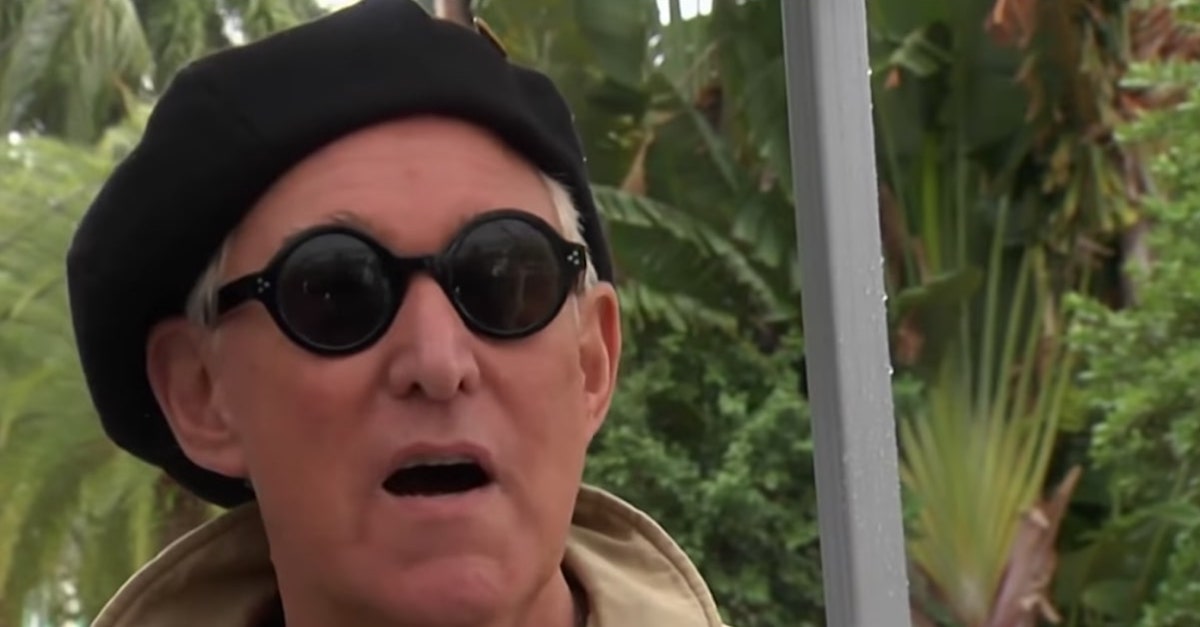
A federal judge issued an order on Tuesday prohibiting President Donald Trump‘s longtime confidant Roger Stone from posting anything on Facebook, Twitter, and Instagram after Stone violated a gag order regarding what he can say publicly about his case.
Referring to a collection of posts Stone wrote regarding the investigation into Russian interference with the 2016 election, U.S. District Judge Amy Berman Jackson found that he was “determined to make himself the subject of the story.” She went on to say that his behavior has “more to do with middle school than with a court of law.”
“Your lawyer had to twist the facts, twist the plain meaning of the order and twist himself into a pretzel to argue these posts didn’t cross the line, and in the end, it wasn’t persuasive,” Jackson added.
Here’s what the full order on the docket said:
MINUTE ORDER as to ROGER J. STONE, JR. After receiving the government’s motion for an order to show cause, the Court ordered that the defendant may file “any response to the government’s motion and must show in writing…why the Court should not find that the defendant has violated the Court’s order dated February 21, 2019 and his conditions of release.” Minute Order dated June 21, 2019. Based on its consideration of the facts and arguments set forth in the motion, the defendant’s response, and the evidence and arguments presented at the hearing held on this date, and for the reasons set forth on the record at the hearing, the Court concluded that the defendant has violated its orders. It deferred taking any action pursuant to 18 U.S.C § 401 and Federal Rule of Criminal Procedure to issue an order to show cause and initiate proceedings to punish the defendant for any violation of the media communication order. However, the Court found it necessary to modify defendant’s conditions of release to ensure his future compliance with those conditions. Therefore, it is ORDERED that the conditions of defendant’s pretrial release, the February 15, 2019 media communications order, and the order of February 21, 2019 are hereby modified to add the following additional condition: during the pendency of this case, defendant may not post or communicate on Instagram, Twitter, or Facebook in any way on any subject, including but not limited to forwarding, liking, re-posting, or re-tweeting anyone else’s statements, articles, posts, or tweets. All previous restrictions on statements made to the media, in public settings, and on other social media about the Special Counsel’s investigation, this case, or any of the participants in the investigation or the case, remain in force as set forth in the Court’s orders of February 15, 2019 and February 21, 2019 and the conditions of release, and the defendant remains bound by all other conditions of release, including the prohibition on contacting witnesses. SO ORDERED. Signed by Judge Amy Berman Jackson on 7/16/19. Signed by Judge Amy Berman Jackson on 7/16/19. (DMK) (Entered: 07/16/2019)
Jackson didn’t go so far as to place Stone in jail pending trial or hold him in contempt of court, calling these options a waste of court resources. In response to Stone apologizing for his actions during a February hearing, however, Jackson told him: “I’m not giving you another chance. I have serious doubts on whether you learned any lesson at all.”
This latest order came after prosecutors demanding a hearing on Stone violating the gag order put in place by Jackson in February. Stone was barred from talking about this case, or Robert Mueller‘s investigation, but was still allowed to use social media to fundraise for his defense. Before this gag order, Stone was given the freedom to discuss the case on social media and to speak with reporters, but he lost that right after posting a picture on Instagram of Jackson next to what appeared to be crosshairs.
It was a collection of different posts, however, that led to this second order. One was a screenshot of an article regarding one of his lawyers’ court filings with the caption, “But where is the @NYTimes? @washingtonpost? @WSJ? @CNN?”
Another post, in which Stone responded to a Politico story and called those who work at the publication as “biased elitist snot-nosed fake news shitheads who’s specialty is distortion by omitting key facts to create a false narrative,” didn’t do much to help his case.
During the hearing, Stone’s attorney Bruce Rogow confirmed that Stone is solely responsible for his Instagram account. Rogow also argued that Stone was only commenting on public information and argued that republishing articles isn’t the same as commenting on the case. He also argued that even if Stone was talking about his case online, it wouldn’t affect jury selection.
Jackson responded that Rogow missed her point. The purpose of the hearing was to determine whether or not Stone violated her order.
Of Stone’s posts, Rogow said: “I don’t think that they violated the court order. I understand how one can look at them and come to a conclusion that, yes, they were either at the line or crossed the line. But Mr. Stone has tried to hew to that line.”
Notably, it seems even the government wasn’t that interested in throwing Stone in jail.
Assistant U.S. Attorney Jonathan Kravis argued that Jackson’s order was neither “ambiguous [n]or unclear.” Kravis did not ask Jackson to hold Stone in contempt but asked that she clarify the language in her new order and consider blocking him from social media. Prosecutors didn’t ask Jackson to revoke Stone’s $250,000 bond, which would have jailed Stone pending trial.
Stone’s trial is set to begin in November.
[Image Via MSNBC Screen Cap]